- Home
- Aharon Appelfeld
Laish Page 4
Laish Read online
Page 4
My mouth also froze. This thought, that I once had a mother and that we were now approaching the town where she was born, moved me greatly. I ran to the river and immersed myself in it. I said the verses that my teacher had told me to say. For a long time I sat at the edge of the water, trying to picture the town where my mother was born. I so very much wanted to be near her, to give her some of my bread and to bring her firewood in the evening, but she is far away and no longer in our world. At times, it seems to me that if I would give charity and pray, she’d come to me.
I picture her in death as floating. I know that it’s forbidden to think like this, but what can I do? The thoughts or, more accurately, the visions press against my eyes. Whenever I’m sad, I eagerly wait for her to be revealed to me.
We reached Sadagora at night. It’s a small town surrounded by tall trees. How did my mother wind up in the north, so far away from this place where she was born? I don’t know. I was told that she followed her husband, who was born in Tarnow. Occasionally I get hold of some scrap of information about my parents’ lives. The old men are sparing with their words, and I haven’t been able to solve this riddle. Yet all the same, somehow I summoned the courage to ask one of the locals if any remnant of my mother’s family survived. The man narrowed his eyes.
“What was her name?”
I fell silent, as if I had been caught in flawed speech.
There’s a bustling commercial center here. Wagons loaded with flour slowly make their way from the mills toward the heart of the green hillside. At this time of the year, the mills work around the clock, and the smell of flour seeps into every corner. I love the smell; it makes me think of the bakeries along the roads we have traveled.
The old men went to pay their respects at the home of the Holy Man of Sadagora, and I accompanied them. I tag along wherever they go, if only to stay away from Ploosh’s watchful eye. When we arrived at the castle, the morning light was at its brightest. Many people were huddled in front of the building, which had been built against an ancient wall. I knew that they were desperate to see the Holy Man. There were people covered with festering wounds, some lacking limbs, and some who grumbled loudly. Here the old men seemed diminished and confused, and they gave alms to the wretched.
“Laishu, you should also give some charity to the needy,” one of the old men whispered to me. I approached one of the sick people and held out a coin to him. He immediately took it without thanking me. I was sorry that it had not occurred to me to give alms.
It was the afternoon, and we went to the Holy Man’s synagogue. It was a spacious synagogue, and I had never seen anything like it. We went inside rather hesitantly and immediately joined in the afternoon prayers. The high walls threw back our voices with multiple echoes. It was strange that here, of all places, I had a vision of my father and mother as I had never seen them, their hands and feet bound, amid a convoy of prisoners. At the time I had no idea of their fate, but I guessed that there was a secret in their lives. The prayers went on longer than usual, and the longer they lasted, the more I felt that my life was bound up in my parents’ secret. On the way back to the wagons, I felt a rush of warm affinity with these streets. The thought that my mother had walked here, that along the way she had come upon the same tall trees that I now saw, the same houses, the same lot in which our wagons were encamped—this thought made me dizzy to the point of tears.
“What are you thinking about, Laishu?” My teacher, Old Avraham, broke into my thoughts.
“I’m thinking about my mother.” I didn’t hide it from him.
“Where was she born?”
“Here.”
“My mother, too,” said the old man, and tears glistened in his eyes.
That night Old Yehezkiel died. Though he was very old, he never spoke of death. On the contrary, he had been sure that his strength would see him through, even if the journey was long. He would talk of going to Jerusalem as a man speaks of leaving the town where he lives to go to the town nearby where his forefathers were born.
Whenever one of the old men passes away, I feel my orphanhood much more keenly. Old Yehezkiel was tall and thin. Even as he aged, he did not become stooped. The other old men, even the tall ones, seemed short next to him. When he would pray, he would seem even taller. I was told that his sons showed him great respect; they sewed silver and gold coins into his coat. Although he was apparently not a great scholar, his manner of listening seemed wondrous to me. Whenever the Torah was being either read or interpreted, an expression of deep attentiveness would fill his face.
“Where are you from?” he once asked me offhandedly.
I didn’t know what to say.
“And the place you were born, where is it?”
When I didn’t answer him, he took a coin from his pocket and said, “Buy yourself a pretzel spread with butter.” Since then, whenever he met me he gave me a coin.
“Grandfather,” I called to him, and then drew back.
“You should always call me that,” he said and hastened toward me.
Since Old Yehezkiel said that to me, I have felt that this wandering convoy is my home, and I do not long for another place. It’s true that people’s expectations here can be boundless and their threats fearsome, but I, thank God, do not go hungry. From time to time people will say, “Laishu is a good lad, he helps the old men,” and I am moved.
But now, after the death of Old Yehezkiel, I feel less bound to these wagons.
7
Everyone in the convoy was at Old Yehezkiel’s funeral. He was buried the same day, in a graveyard full of old headstones. In his honor the old men did not allow the locals to wash his body for burial. They bathed and prepared his body for burial with their own hands, and then they carried the stretcher to the mouth of the pit with silent steps.
I have again seen with my own eyes the fiery barrier between the living and the dead, and I swore to myself to do good in the eyes of God, not to daydream or slack off, to pray, and to give charity to Blind Menachem. And like all the other funerals I had attended, this one, too, was without tears. The silence seemed solid; you could have cut it into pieces.
“He didn’t make it.”
“No, he didn’t make it!” the old men railed, their sorrow turning to rage. “If it hadn’t been for the thugs, if it hadn’t been for the dealers who have delayed the convoy, we would have been in Galacz already.” This time they held back nothing.
True, there are some dealers here with wide-ranging business interests, and there are those who have invested their capital in real estate. Even as we travel on, messengers work on their behalf after they have departed and in advance of their arrival. Naturally there are all kinds of shady dealings. Two months ago we were surrounded by gendarmes who would have searched us and made arrests. The dealers immediately went out to meet and bribe them. We were lucky that they were satisfied with what we gave them, and they returned as they had come. There is some justification to the old men’s sighs when they say that because of these money-grubbers they will die in darkness, never reaching Jerusalem.
Complaints, I’ve already learned, are of no use. The compulsion to make money overrides everything. Even a deal that is not all that substantial is enough to make them swerve the wagons off the main road. In their blindness, they assume that they can deceive the old men and confuse them. But how wrong they are! The old men have extraordinary memories, their senses are razor-sharp, and the slightest deviation from the highway rattles them. But they are not able to bring the sturdy horses to a halt. The horses gallop in the direction that the wagon drivers steer them.
“God will not forgive you!” You can hear their fury at night.
—
On the following day, too, the old men stood in a long line to ask the Holy Man of Sadagora for his blessing. I caught a glimpse of him amid suffering and embittered people, and I was moved. They stood waiting for hours. Toward evening it was clear that only the strong and those who pushed forward would get through the entrance, while the rest wou
ld have a long wait. At night the old men returned to the wagons and said their evening prayers in the dejected tones of mourners.
“Do you worry about the time to come?” My teacher, Old Avraham, suddenly turned to me.
I was terrified. “My teacher, what should I be doing?”
“Not neglecting your Torah studies.”
I study whenever I get a free hour, but it is hard for me to learn things by heart. If I knew the verses by heart, my teacher would grant me greater favor. But because my memory is not so good, I try to make up for my shortcomings by helping the old men. I chop wood, light bonfires, prepare coffee, and wash dishes.
And despite all this, I could not elude Ploosh’s clutches. During the night, while I was curled up on my pallet in the wagon, he came over to me.
“Why are you giving me the slip, you thief?”
“I’m helping the old men.”
“If you don’t help Ploosh, then Ploosh will throw you off the wagon. You hear me?”
“And who will make the old men coffee after prayers?” I pleaded for my freedom.
“That’s not your concern. Starting tomorrow, you’re with me.”
So that was how the wolf sprang out at me: I knew that my life hung suspended over an abyss, but I didn’t imagine that it could just be sloughed off like this. Had Fingerhut been alive, I would have fled to him. Fingerhut had very good connections with the wagon drivers. He would lend them money without receipts and promissory notes, and they respected him for this. But Fingerhut was now in the World of Truth while I was in this world, where the darkness was as high as a wall.
I was too afraid not to obey Ploosh, and the following day found me standing before him. That very day my enslavement began. I worked from the early hours of the morning until darkness. My teacher, Old Avraham, tried to rescue me from Ploosh’s clutches, but his entreaty fell on deaf ears.
“He has to work,” Ploosh muttered. “There are no free rides.”
I thought of running away, joining the beggars, but my dread of Ploosh hovered over me like a whip. I saw how he lashed the horses and I knew that my fate would be no different.
Ploosh worked me relentlessly. Within a week, I learned how to wash down the horses, give them food, water them, and carry a sack of barley on my shoulder. He would punish me immediately for any negligence or mistake. Once he beat me till I bled. When I tried to excuse myself, he called out in rage, “Shut up, you criminal!” and slapped my face. The old men saw my suffering, tried to come to my rescue, and even threatened to declare a fast, but Ploosh, who usually responded to their entreaties, was unyielding. “He must learn how to behave. A few slaps won’t harm him.”
“You have to be mindful of orphans, they’re protected by God,” my teacher cried out to him in great despair.
That was how I became a slave in the city where my mother had been born.
—
Ploosh does not talk to me; he only mutters. If I do not obey his mutterings immediately, he slaps my face and kicks me, but here’s the wonder: I’ve learned to understand his mutterings and do his bidding based on the garbled syllables that emerge from his mouth. At night, I lie on my pallet and ask my mother to save me from this enslavement. Now I see her as a short, thin woman. For some reason, I’m sure that my mother is trying with her entire soul to intercede on my behalf. Her willingness to endanger herself fills me with courage, and I wait with great longing for her to reveal herself. Were she to command me to jump into the Prut, I would jump. Death, after all, would bring me nearer to her.
One night, my teacher, Old Avraham, stole over to me and said, “Laishu, don’t despair. God is everywhere, even the deepest pit. If you call Him, He’ll answer you. He can do anything.” I was happy that he had approached me, and I promised him that I would be strict in my observance of ritual hand washing and in praying. On hearing my promise, he blessed me.
—
The elderly are also suffering. They returned to the Holy Man’s castle many times. I saw them come back at night, dejected and dispirited, gathering alongside the wagons and praying softly. On hearing their pleas I also asked God to shorten the journey and bring us quickly to Jerusalem. Since my enslavement, I see Jerusalem very differently: as a tall mountain overhung with thorny foliage, with strong guards at every point of entry to prevent people from climbing up the slope.
“Let us ascend the Holy Mountain!” the old men beg. “Our days on earth are numbered.”
“Quiet!” shout the guards, blocking their ears to the cries for help.
Were it not for my teacher, who comes to me at night, quietly reads to me the weekly Torah portion and a chapter from The Path of the Just, and imbues me with faith, I would be lost in my enslavement.
—
Most of the day we’re out plowing. Even the sturdy horses find it hard to plow this heavy earth. Ploosh works them mercilessly, and if they slack off he vents his rage on them. On the days when there is no plowing, our work is to transport logs from the forest to the warehouses, and to deliver sacks from the granaries to the flour mills.
I find it hard to wake up in the dark, but I do. I rise, water the horses, and immediately hitch them to the wagon. The melodies that once ran through my head before the morning prayers, giving me joy, have fled. After work, I sink into sleep as into a deep hole.
I feel my orphanhood all the more in this town where my mother was born. When I complained to my teacher, he rebuked me, “It’s forbidden to despair. You have to see this as a test. God tests us just as he tested Avraham, our forefather, and we have to accept these trials with love.”
Meanwhile, my life is like that of the beasts with whom I plow. Ploosh lashes them and lashes me with the same whip.
8
While I was being crushed under the unrelenting hand of Ploosh, something dreadful happened. One of the dealers, a quiet one whose existence in the convoy we were hardly aware of, went over to Ploosh and asked him to pay what he owed him. Ploosh mumbled something like “Don’t bother me, I’ll pay you back.” The dealer did not let up but continued making his demands. Ploosh’s patience ran out, and he made a movement with his right hand as if to silence him, but the dealer did not budge. He went on presenting his arguments. Ploosh ignored him and turned away. Then the dealer raised his voice and shouted, “It’s my money!” Ploosh again made a gesture of dismissal with his hand, grinning to himself.
Even then the dealer wasn’t afraid, and he threatened to bring the case before the convoy’s committee. If they could not retrieve his debt, then he would go to the authorities.
“Shut your mouth,” said Ploosh without turning his head toward him.
“I won’t shut up,” said the dealer, putting his very life in jeopardy. From up close, he seemed dreadfully thin. He knew that Ploosh wasn’t used to being bothered; some of us had even felt the muscles in his forearm. But for some reason the dealer insisted, standing his ground. It was as if he had sworn to himself that fear would possess him no longer.
“Why are you annoying Ploosh?” Ploosh raised his head and addressed him directly.
“I’m not moving from here until you return my money to me.” The dealer spoke in a grating voice.
“Ploosh advises you to scram and not drive him crazy.” Ploosh spoke in a voice that was restrained, with even a measure of moderation.
“I’m not afraid.”
Ploosh must have been astonished by the dealer’s lunacy. Perhaps he was afraid to touch this skeleton of a man. In any case, he didn’t touch him, but muttered something and became immersed in his work.
It was midday and everyone was busy preparing their meals. The conversation, which hadn’t been loud, did not arouse worry. People here quarrel over everything, screaming and cursing.
After a few minutes of silence, the dealer shook himself out of his silence and said, “I won’t move from here.”
Ploosh did not react to this, either.
Then the dealer poured out a flood of words about the debt. He e
ven stamped his feet. Because he was so short and skinny, he looked like a child who had been denied his demands. That stamping of his feet must have been what set Ploosh off. Without saying a word and without glancing at the dealer, almost as if he didn’t quite mean what he was doing, Ploosh went over to the dealer and threw him like one tosses a log onto a pile. He didn’t throw him with anger—it didn’t even seem that forceful—but the ground was dry and the dealer’s body fell heavily upon it.
At first, it seemed as though the dealer was about to get up, because his right leg lifted a little. But it only seemed that way. He let out a braying sound and began to shake. The people nearby rushed over to him. One of the old men knelt down and raised the dealer’s head, while another bent over his legs and massaged them. On the ground, the dealer looked even more like a child.
All this time Ploosh stood by his wagon, mumbling in discomfort. But when the tumult began to grow, he sat down under it. People gathered from all the wagons and surrounded the area. The old men spoke to the victim gently, their words sounding like whispers.
The victim didn’t react.
“Let him rest,” said an old man, wringing his hands.
People stood around for a long time in a kind of frozen intensity that resembled silent prayer. And when this, too, did not help, one of the old men called out loudly that Reb Mordechai would never be forgotten.
“Get up, Reb Mordechai; get up, brother! We’re here, eagerly waiting for you!”
The dealer did not react even to this.
The old men took a few steps back and returned to their wagons. The clearing, which had been packed with people, was now filled with emptiness.
One of the dealers brought a blanket and covered the victim. At that moment it looked as if Ploosh was about to climb onto one of the horses and make his getaway. But this, too, only seemed so. Ploosh took a swig from his bottle, lit a cigarette, and did not stir.
Later, two gendarmes arrived.
“Where’s the murderer?” they asked.

 Long Summer Nights
Long Summer Nights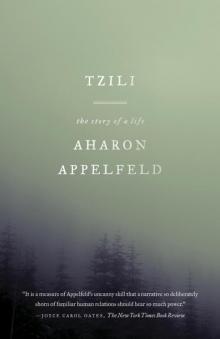 Tzili
Tzili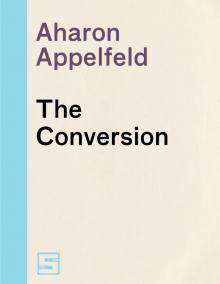 The Conversion
The Conversion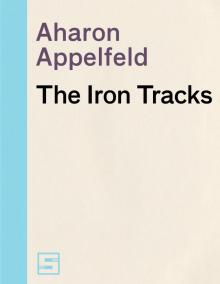 The Iron Tracks
The Iron Tracks All Whom I Have Loved
All Whom I Have Loved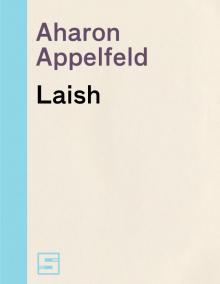 Laish
Laish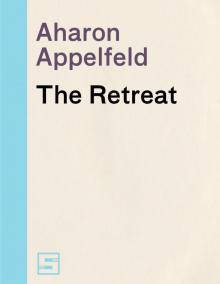 The Retreat
The Retreat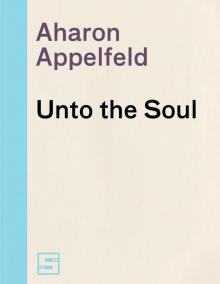 Unto the Soul
Unto the Soul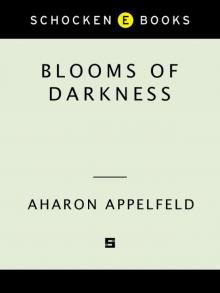 Blooms of Darkness
Blooms of Darkness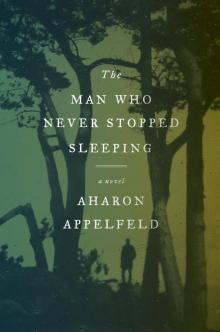 The Man Who Never Stopped Sleeping
The Man Who Never Stopped Sleeping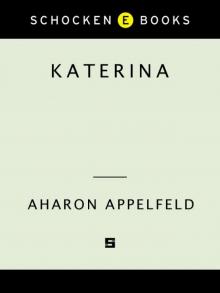 Katerina
Katerina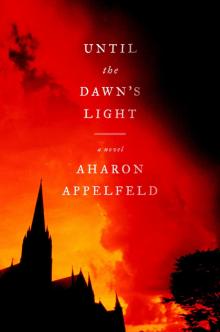 Until the Dawn's Light
Until the Dawn's Light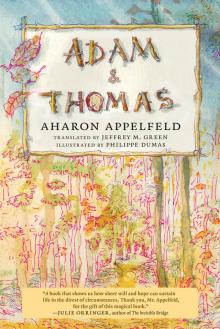 Adam and Thomas
Adam and Thomas Suddenly, Love
Suddenly, Love